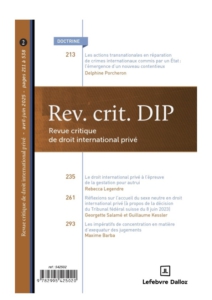Membership
On 1 July 2021, Mongolia deposited its instrument of acceptance of the Statute, becoming the 89th Member of the HCCH. More information is available here.
Conventions & Instruments
On 3 July 2021, the HCCH 1961 Apostille Convention entered into force for Jamaica. It currently has 120 Contracting Parties. More information is available here.
On 30 July 2021, the HCCH 1970 Evidence Convention entered into force for Georgia. It currently has 64 Contracting Parties. More information is available here.
Meetings & Events
From 5 to 9 July 2021, the Experts’ Group on Parentage/Surrogacy met for the ninth time, via videoconference. The Group discussed the scope of the possible draft Convention on legal parentage and the scope of the possible draft Protocol on legal parentage established as a result of an (international) surrogacy arrangement. More information is available here.
On 27 July 2021, the Permanent Bureau announced that Edition 2021 of HCCH a|Bridged will be dedicated to the HCCH 2005 Choice of Court Convention and held online on 1 December 2021. More information is available here.
On 28 July 2021, the Permanent Bureau launched the Advancing and Promoting the Protection of All Children (Approach) Initiative, in celebration of the 25th anniversary of the HCCH 1996 Child Protection Convention. As part of this initiative, the Permanent Bureau is organising two competitions: the HCCH|Approach Essay Competition and the HCCH|Approach Media and Design Competition. Submissions are due on 1 October 2021. More information is available here.
Publications & Documentation
On 2 July 2021, the Permanent Bureau announced the publication of translations, in Albanian, Macedonian, and Bosnian-Serbian-Montenegrin languages, of the Explanatory Report on the HCCH 2019 Judgments Convention. These are the first available translations after the official publication of the Explanatory Report in October 2020. They were supported by the Deutsche Gesellschaft für Internationale Zusammenarbeit (GIZ), Open Regional Fund for South East Europe – Legal Reform (ORF – Legal Reform). More information is available here.
These monthly updates are published by the Permanent Bureau of the Hague Conference on Private International Law (HCCH), providing an overview of the latest developments. More information and materials are available on the HCCH website.

 Written by Hadrien Pauchard (assistant researcher and doctoral student at Sciences Po Law School)
Written by Hadrien Pauchard (assistant researcher and doctoral student at Sciences Po Law School)